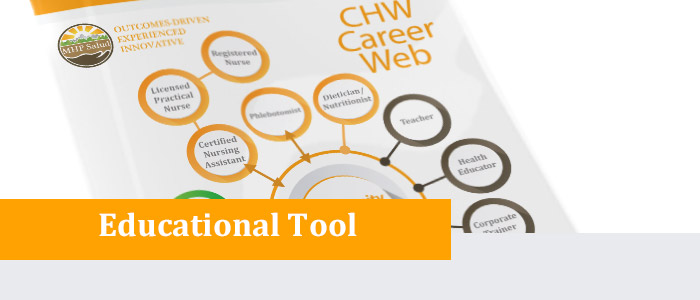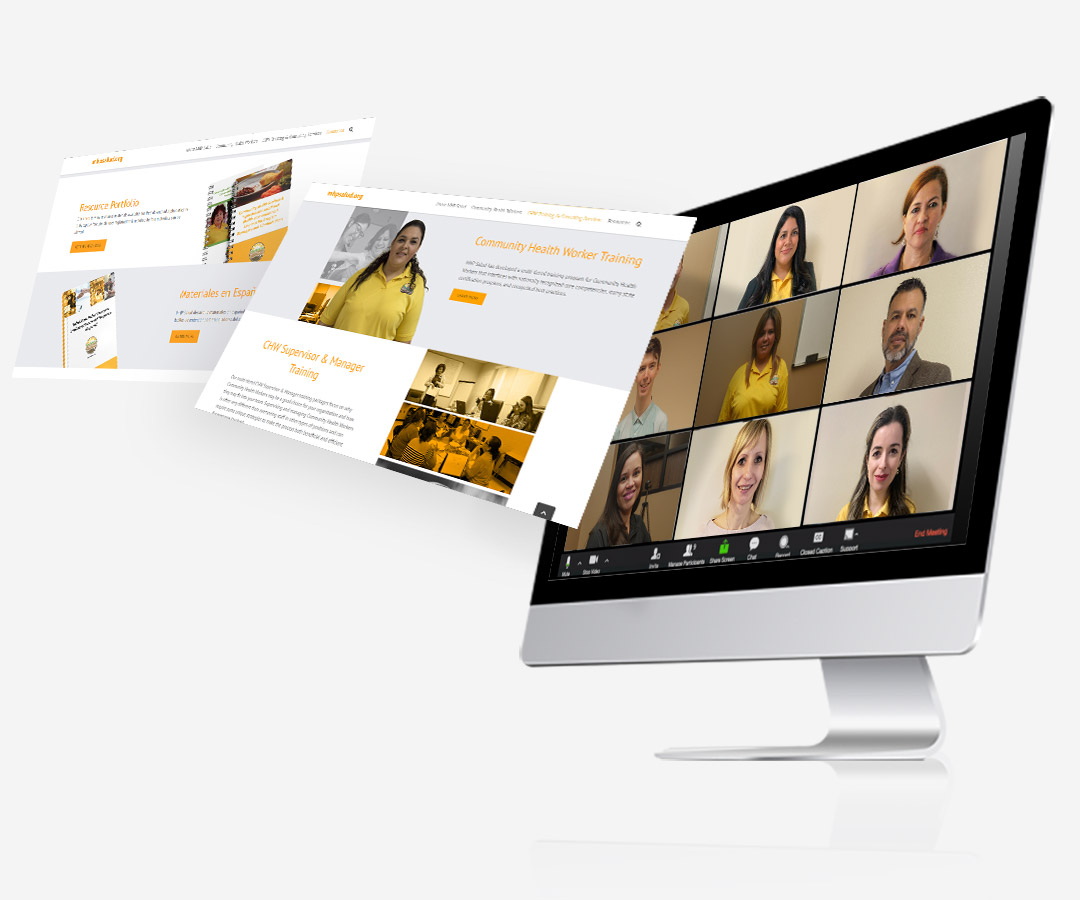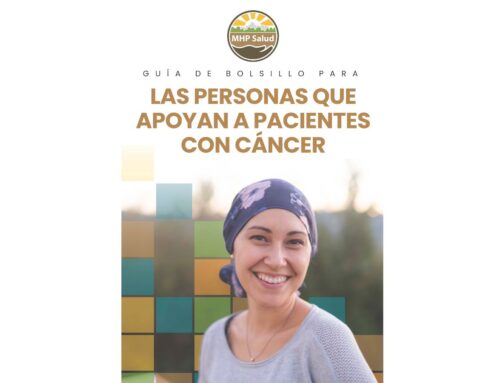Careers in Health, Education, and Social Work Spotlight
Published June 2021 | Back to all news and updates
Community Health Workers Have Many Career Paths
The unique nature of work performed by Community Health Workers (CHWs) allows them to cross over into many different career paths. Typically, the progression from one career to the next is visualized as a “career ladder” which describes climbing upwards towards a better or higher-paying position. However, because the skillset required of a CHW overlaps with skillsets required from many other professions, a CHW’s career movement cannot solely be described as going “up” and “down” or being better or worse.
Rather, a “career web”, which allows for movement in many directions, better depicts the idea that there are a variety of different paths that can lead an individual into and out of the CHW profession.
Although there are different career paths for a CHW, many people have vibrant and successful careers as lifelong CHWs. As with all things in the workforce, longer experience in a role often increases how effective an individual is in that role.
Each month, we will highlight the journey of individuals’ professional development into roles within and outside of the CHW profession. The first story is about Marco’s journey from CHW to Eligibility Specialist. The second features Ricardo, who also became an Eligibility Specialist, but unlike Marco, he did not start out as a CHW. This story is included to illustrate how the CHW profession builds skillsets that are desirable across industries. It is also included to illustrate the key differences between the CHW profession and other careers in related fields.
Marco’s Story: From Community Health Worker to Eligibility Specialist

Marco was employed as a CHW at an organization that links individuals in the community to safety-net programs like Medicaid and CHIP. His position required a lot of traveling and walking in the community so that he could reach individuals in remote areas. As he aged, it became difficult for him to get around making him consider a career change into a job that was more sedentary. He wanted to maintain similar work and at this point in his life, he did not want to have to go back to school. He began looking online through Indeed and asked other CHWs if they had any recommendations for possible career options.
Eventually, Marco came across the eligibility specialist role. The role had similar responsibilities to his job as a CHW, such as assessing whether individuals qualify for safety net programs. Additionally, it would not require him to go back to school and he would be able to work in an office environment. He did notice that the role recommended strong experience with computers, which he did not have much experience in. He decided he would take a basic computer course before applying for jobs to ensure he was prepared. He searched for a position for about a month until he got an interview at a social services office that was looking for an eligibility specialist. The position preferred knowledge in Medicaid and CHIP, which he had previous experience with because of his work as a CHW. He ended up getting the position and began his career as an Eligibility Specialist.
Ricardo’s Story: From Customer Service Representative to Eligibility Specialist

Ricardo worked as a customer service representative at a large cell phone company for about four years. In his spare time, he would volunteer as a patient assistant at a local health center. While talking to patients at the health center, he noticed that many of them were concerned about how they would pay for care. He knew about programs such as Medicaid that could help patients receive health insurance, but it seemed like many patients were unsure how to apply. He began to wonder how he could help these individuals more and make a career out of it. After some careful online searching, he was able to narrow his search down to the CHW and eligibility specialist roles. Both of the roles would allow him to help link individuals to government programs. However, he was concerned about becoming a CHW as he would have to travel into the community. The eligibility specialist role required many of the same skills as a customer service representative, like answering customer questions and phone communication. Additionally, he would not have to be out in the community and could work in an office. He eventually decided to move forward with the eligibility specialist path as it fell more in line with his preferences and experience.
Ricardo decided to begin the process of becoming an eligibility specialist. He started the process by comprehensively searching online job posting websites like Indeed, LinkedIn, and Monster. He noticed during the search that some employers required some college and he only had a high school diploma. He did not want to go back to school, so he focused on positions without the additional education requirement. He also noticed that most employers preferred knowledge in Medicaid and CHIP, which he had limited experience in. Eventually, he came across an entry-level role with a state health care company that specialized in Medicaid. He decided to apply for the position and was quickly offered an interview. During the interview, he was very explicit about his level of Medicaid knowledge. The interviewers explained that it was not an issue, as all entry-level positions get Medicaid training to prepare incoming employees. After the interview, a couple of weeks went by without an answer. Finally, after a short wait, Ricardo got the job as an eligibility specialist.
Note these stories are based on real-life scenarios but contain fictional characters.
Download the CHW Career Web Model Resource for free!

Our CHW Career Web Model resource demonstrates the numerous ways that an individual can find themselves becoming a CHW or how they may progress their career under various ‘career clusters’ like social work, clinical, or advocacy after being a CHW. The resource can be used as a tool by organizations that work with CHWs such as community-based organizations, CHW Associations, Federally Qualified Health Centers (FQHCs), Primary Care Associations (PCAs), and Area Health Educations Centers (AHECs) to help explain the different career trajectories those in the CHW workforce have.
Blog Topics
About MHP Salud

MHP Salud has over 35 years of experience implementing CHW programs and training organizations looking to start and/or strengthen their own CHW programs. Visit our CHW Training & Consulting Services page to learn more about how we can help.






